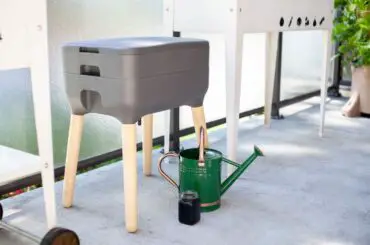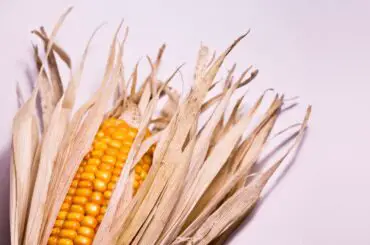Mushroom compost is a special compost type. So, we are going to address what makes this compost special in this article. Also I will be covering how to make mushroom compost at home on your own too. Further I will be taking you through how to use it in your garden as well.
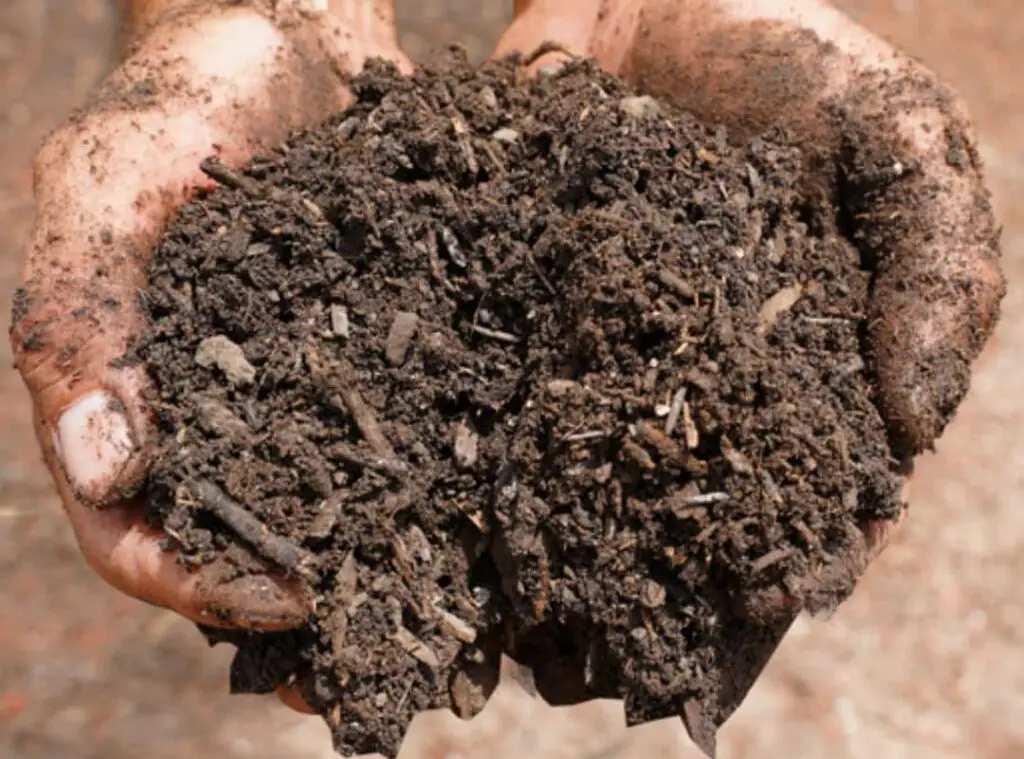
So, have you ever wondered what mushroom compost is? One might think it is made out of mushrooms. In fact, it is the medium which is used to grow edible fungi or mushroom. Many gardeners like to use the mushroom growing kits which are available in the market.
Mushrooms would usually grow in medium compost of wood chips, sawdust, peat moss, sphagnum moss, wheat straw, and hay bedding. Further chicken manure, horse manure gypsum corn cobs wheat seeds soybean meals would also make perfect growing mediums for mushrooms. Mushrooms are not plants. Further they cannot produce food on their own too. Due to the inability to produce food on their own, they would tend to break down the substrate materials and then obtain the nourishment from those.
Once they complete doing this process, it would make the mushroom substrate gross and stink too. However, all these metabolic activities would consequently make the mushroom substrate enriched with nutrients. Ultimately this would act as a perfect fertilizer type which you could use on your crops.
How To Make Mushroom Compost at Home?
Contents
- 1 How To Make Mushroom Compost at Home?
- 2 How to Treat Mushroom Compost
- 3 What Plants Love Mushroom Compost
- 4 What plants don’t love mushroom compost
- 5 Advantages of using mushroom compost
- 6 What Are the Disadvantages of Mushroom Compost?
- 7 How do you overcome these advantages?
- 8 When to Use Mushroom Compost?
- 9 How do you use mushroom compost as mulch?
- 10 How do you use mushroom compost as soil amendment ?
- 11 Growing Mushrooms
- 12 How Long Can You Keep Mushroom Compost?
- 13 Can You Add Mushroom Compost to Raised Beds?
- 14 Is Mushroom Compost Toxic to Dogs?
- 15 Which Manure Is Best for Mushroom Compost?
- 16 What Compost Is Best for Vegetable Gardens?
- 17 Is Mushroom Compost Acidic
- 18 Is Mushroom Compost Better Than Regular Compost?
- 19 Conclusion
If you wish to make a comparable product for mushroom composting, the very first thing you need to do is to do a hot compost process for about two weeks’ time. The temperature should ideally exceed 160 degrees Fahrenheit in the compost pile here. Once you expose the compost pile for these temperatures, it would help to eradicate any harmful microorganisms available in the compost mix by killing harmful weed seeds.
Furthermore, it is important that you turn the compost pile on a regular basis to have a hot compost process. Once you turn , it would contribute to a better air flow in the compost pile. Further the materials which have not finished composting would make their way to the center of the pile and start composting faster. In addition to that I urge you to supply some water with a hose as it is important that you keep the compost pile moist as well.
When these activities take place for about two weeks, you need to create another compost pile and allow the compost materials to compost for two more weeks. Ultimately it would make the compost darker brown in color and fasten the breaking down of the composting materials as well.
It is not essential to turn the secondary compost pile as you don’t need to make them go through the hot composting process once again. Ensure that you keep them moist and let them start decaying. Once they finish decaying, you are ready with the mushroom composting.
Pasteurization and Sterilization
If you wish to use this compost for the mushroom growing, you will want to pasteurize them. On the other hand, if you used hardwood sawdust, I suggest sterilizing them. However, if you used straw, manure or coffee grounds , you need to pasteurize them.
To do that you simply have to first bring a large pot filled with water which is at the boiling temperature. Thereafter place the compost materials either in a mesh or in a cloth bag. Next, submerge them in the pot while reducing the heat. Next leave it for about one hour to one and half hour and you are done with pasteurizing them.
However, the sterilization process is somewhat complex. That said, many people opt to do that by cooking the substrate in a pressure cooker at 15 PSI and over 250 degrees for 2.5 hours. Furthermore you need to introduce some moisture before you do this activity to further ensure that the substrate is already in the grow bag too. Once you follow these tips, it will sterilize all including both the grow bag and the substrate as well.
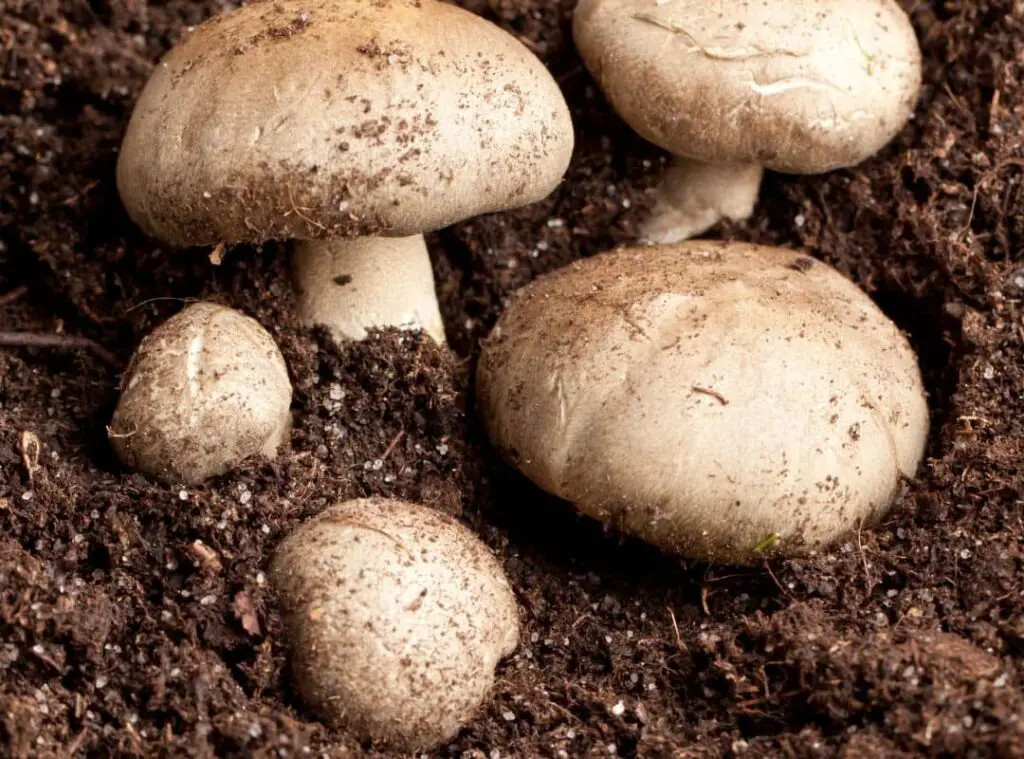
How to Treat Mushroom Compost
I suggest you treat the freshly purchased mushroom compost with compost tea or introduce significant levels of regular compost. The purpose of doing this activity is to re-introduce beneficial microorganisms and to get rid of the harmful elements which would eventually make a high quality soil.
This compost may come up with soluble salts which would be a threat for acid loving plants such as magnolias, camellias azaleas rhododendrons and lastly blueberry bushes. Thus, when you practice these little steps, it would help you to remove these harmful elements.
Apart from these methods, there are some other ways of treating the compost to make them more suitable. For example, you could try out doing vermicomposting where you will be using live worms for the composting process.
Furthermore, you could leave the compost to be in open air as it would also allow them to further decompensate. All these activities would make the compost further effective by adding beneficial microorganisms and by removing high salt levels. Ultimately it would contribute to vigorous growth in the plants too.
What Plants Love Mushroom Compost
Mushroom compost is a popular fertilizer type which many people tend to apply for Turfgrass, trees, shrubs and for some flowering plants as well. I suggest you use more mushroom compost as they are enriched with multiple nutrients. Further their water retention capacity makes them excellent choices for these plants. In addition to these you could apply the mushroom compost on crops which are not fuzzy for higher salt levels.
For example, you could apply these on crops such as Beets, bell peppers, Broccoli, cabbage, Kale, Loquats spinach, Tomato Carrots and cauliflower. Additionally, you may use them on Lettuce, peas, potato squash and on sweet corn too.
What plants don’t love mushroom compost
Keep in mind that the salt content of the mushroom compost may be harmful for some of the plants such as Azaleas, Magnolias, Rhododendrons, Blueberries etc. in fact the salt content of the mushroom compost would make these plants struggle to absorb the essential nutrients for them.
In addition to aforesaid plants, beans, celery, cucumbers and Radishes would also not prefer to have mushroom compost. That said, you could still use these on these plants by adjusting the mushroom compost level you provide for them.
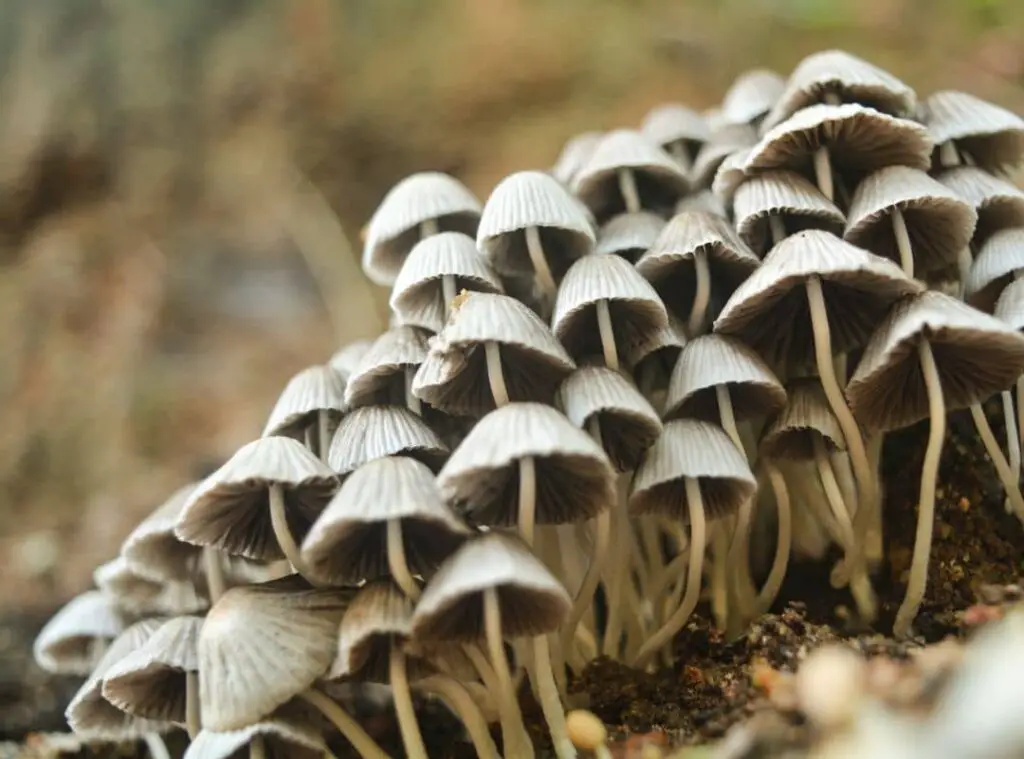
Advantages of using mushroom compost
Using mushroom compost on your soil would be quite beneficial in many aspects. Generally mushroom compost contains a good balance of organic compounds which plays a major role in making your soil fertile.
In addition to that it further contains a good balance of macronutrients and with micronutrients which is crucial for assuring vigorous plant growth. What is more special about the mushroom compost is that it has neutral ph. range and that characteristics make most nutrients available to the plants. Apart from these , mushroom compost would be beneficial in enhancing the quality of the sandy and clay like soil as well.
As you may already be aware, usually sandy soil would contribute for a faster draining whereas clay soil would be too compact for planting. So, when you mix mushroom compost into these soil mixes, it would balance out both the water retention capacity and the proper aeration capacity in the soil.
Furthermore, mushroom compost is a sustainable fertilizer type too. In fact, Mushroom farming would allow you to get a lot of spent mushroom substrate. Consequently, it would minimize the waste in landfills and that characteristic makes them a sustainable fertilizer option.
Anybody could use this as it is an affordable option and chances are that you may even obtain them free of charge from the local mushroom farmers as it would be a fine opportunity for them to get rid of the wastage. Thus, to sum up, using mushroom compost is an effective and a productive way of fertilizing your crops. It has numerous advantages as explained in the above.
What Are the Disadvantages of Mushroom Compost?
One of the main disadvantages of using mushroom compost is that you would not know what mushroom compost does. In fact, chances are that they may contain harmful elements. For example there is a potential for you to end up adding harmful elements such as pesticides on your crops. So, if you fertilize your crops with mushroom compost in significant levels without underrating what they exactly comprise of, you would not be able to reap an organic harvest.
How do you overcome these advantages?
You could consider letting the spent mushroom compost blocks to wither on the garden beds first and then use them at first. Next, you could consider sterilizing the spent mushroom substrate as well.
Once you do these steps, it would help you to get rid of whatever harmful pesticides or any other antibiotics which could be potentially available in the mix. In fact, these activities can even kill the weed seeds or any other mold spores as well. Further, always try to go ahead with organic manure so that you can assure yourself that you are using all fresh, clean and 100 % organic materials for your vegetative plants.
If you are using commercial mushroom kits, it would be easier for you to track the ingredients inside the compost mix. All you have to do is simply check the packaging and educate yourself on what it comprises.
When to Use Mushroom Compost?
I suggest you use mushroom compost from spring to summer on your crops.
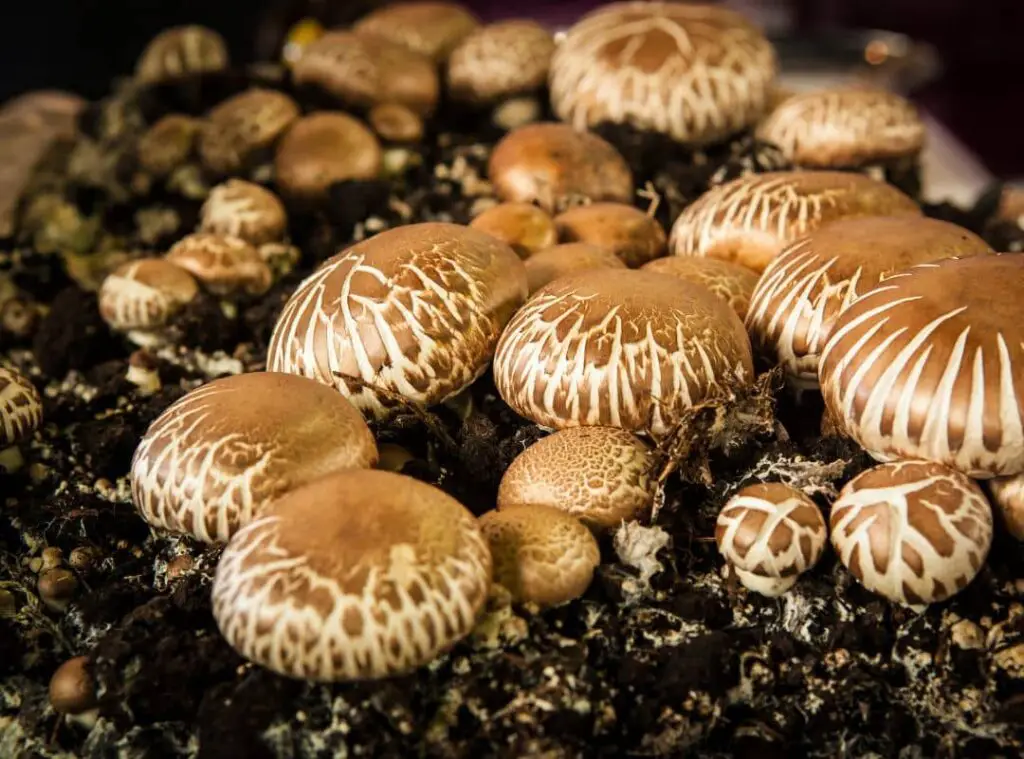
How do you use mushroom compost as mulch?
Once you use fresh mushroom compost as mulch, it would help the soil to keep moisture in it. The moisture in the soil is a crucial factor for the germination of the seeds. Further it would avoid any potential growth of the weed seeds as they contain high salt levels.
If you wish to use mushroom compost as mulch you need to use about 1 to 3 inches of mushroom compost. Once you stick to those ratios, it would be easy for them to retain water and to suppress the weeds as well.
When you mulch the soil with mushroom compost , you don’t even want to water the soil quite often either. Furthermore it is not even essential to apply fertilizers often too. That is simply because the compost layers would provide all the nutrients which are required to nourish the plants.
How do you use mushroom compost as soil amendment ?
Once you add mushroom compost on your crops, it would nourish the soil and it is a known fact. However bear in mind that the mushroom compost may contain high salt levels. As such, I suggest you use only 25 % to 50 % of the mushroom compost and it would be good enough to apply on the plants. If we compare the manure and the composting materials with fresh mushroom compost, all of these elements would have the same texture when you apply them on the soil.
The reason behind it is that mushroom compost contains a finer soil like particles and it would make it easy for them to mix in the soil. Additionally , mushroom compost doesn’t require a longer period to break down as well. On the other hand, hay clumps in cow manure would take a longer period to decay. Mushroom compost is a slow release fertilizer which literally means you don’t need to water them or fertilize the soil on a frequent basis.
Mushroom compost usually develops rapidly in the average backyard compost pile. Furthermore, you could consider adding the leftovers from your kitchen to hot compost so that it would speed up the decaying of the materials in the compost pile. Consequently plants would find it easy to absorb the nutrients from the soil too.
Growing Mushrooms
One more fine way of using mushroom compost is to use them for growing mushrooms. Many mushroom grow kits companies are concerned about their sustainability. If you had used them for some time and the compost bag didn’t have flushes, they may still carry mushroom spores inside the bag.
So, you could crumble them in your garden and use them for growing the mushrooms. In fact, you could use regular mulch and await patiently till you could spot a new flush. If everything goes smoothly, you are ready with a patch which you could grow for growing the mushrooms right throughout the year.
How Long Can You Keep Mushroom Compost?
You can keep mushroom compost for a longer period . However you need to ensure that you don’t make it too wet. Keep in mind that excess moisture would be somewhat unhealthy for the plants.
Literally, excess moisture would allow the unhealthy bacteria to grow. They can even change the chemical composition of the compost also. Hence, you need to always try to keep the mushroom compost dry and then store it in the bags.
Ideally you need to leave it in a spot where the sunlight can dry them and where they will be secured from the rainfall. When they are dry, you could store them in the bag and store them in a safer place. Once you utilize them all you need to do is rehydrate them and then use them.
Can You Add Mushroom Compost to Raised Beds?
Yes, you can add mushroom compost to raised beds. That said, you need to ensure that there is proper drainage in the raised beds though. Do not ever make the soil compact in raised beds as that would halt the plants roots spreading freely since there would be less room for them to grow. If you wish to keep a fluffy soil structure, you could consider using the mushroom compost. It would contribute to proper air circulation. In the root system. Lastly it would also help the plants roots to absorb nutrients effectively too
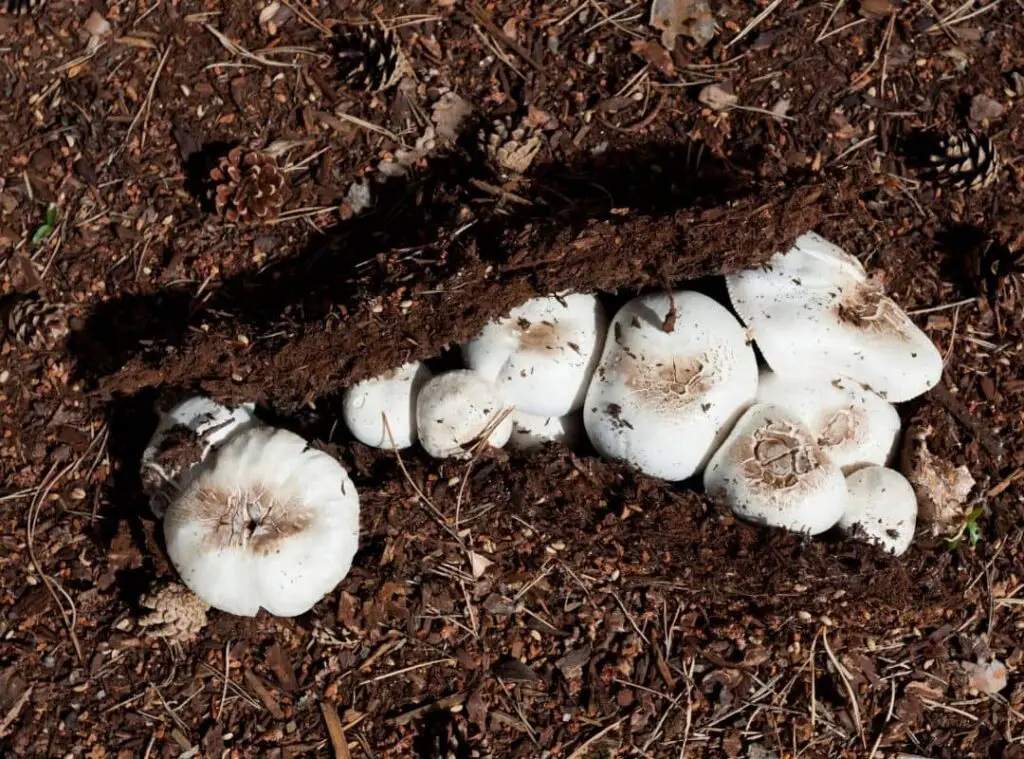
Is Mushroom Compost Toxic to Dogs?
Mushroom compost could be poisonous towards dogs. Mushroom compost contains mushroom spores and the rest of other microorganisms in it. Compost is usually made out of yard leftovers and they may contain poisonous mushroom spores. Dogs are quite capable of digging the soil and that would make it easy for the harmful substances to reach the system of the dogs. Ultimately it would cause mycotoxicosis.
Once they get in contact with these harmful elements, they may even develop digestive problems. Further if the infection is severe, they may even develop issues in the neurologic system as well. So, ensure that you keep the compost far from the dogs so that they cannot dig into the compost.
Which Manure Is Best for Mushroom Compost?
I would say the best manure to use for mushroom compost is chicken horse manure as they comprise high nutrients. Alternatively, you may consider horse manure also to do this task as that would also contain a significant number of nutrients.
However many people opt to go ahead with chicken manure as they usually have smaller particles. Once you use small particles it would be easier for them to break down as well. That said, there are some concerns in using the chicken manure as well. For example , they may carry traces of antibiotics. On the other hand, horse manure may contain pesticides as they would tend to graze in places where there would be pesticides available. So, both these manure types may contain disadvantages.
However if you use 100 % organic manure, it would give out a completely organic compost which consists of macronutrients for your soil mix.
What Compost Is Best for Vegetable Gardens?
The dark and the aged compost variety is the best for the vegetable gardens. Aged compost doesn’t not comprise any recognizable plant materials, and you cannot identify what exactly it consists of. For example, if you had put banana peels in a composting pile, you wouldn’t recognize it from the look of bananas. Instead, it would be completely composted and made it easy for the plants to absorb the nutrients from the soil. Ultimately it would allow you to harvest the biggest crops in a short period of time.
Is Mushroom Compost Acidic
One might think that mushroom compost is acidic. In fact, if you don’t use the mushroom compost properly it would make the seedlings die and that feature has made people think mushroom compost is acidic.
When you plant the seeds and the seedlings, heat in the mushroom compost may sometimes kill the plant’s roots or prevent the seeds from germinating. So, ideally you need to allow the mushroom compost to cool down and then use. Hence, you could call mushroom compost as alkaline rather than acidic.
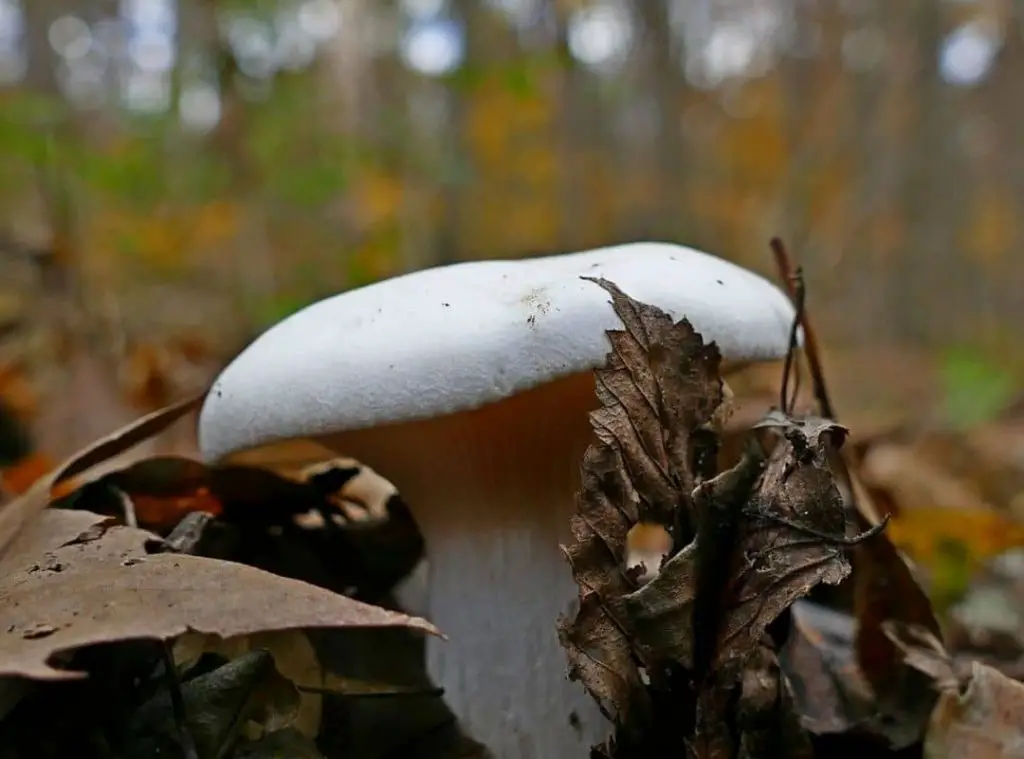
Is Mushroom Compost Better Than Regular Compost?
Undoubtedly Both mushroom compost and regular compost act as great sources of nutrients. You could usually use mushroom compost annually either as mulch or as a soil amendment. On the other hand, you could use regular compost as a frequently applied plant food since it would not make any impact on the pH range of the soil.
Mushrooms would act as a perfect law dressing than the regular compost as mushroom compost supply multiple nutrients. Further if you are looking for a compost which is completely free from the weeds and which has an ability to slowly release the nutrients, I suggest you go ahead with the mushroom compost. On the other hand, if you are looking for a regular plant food, you can go ahead with the regular composting food.
Conclusion
To recap, mushroom compost is such a great way of providing nutrients for your soil. it is more like a mix of animal manure and yard leftovers which would be really beneficial for the plants. That said, keep in mind that mushroom compost is not a soil additive. So, before you use it you need to check the soil condition and on the plants you wish to grow as well.
Keep in mind that you need to apply only a very small amount of mushroom compost and it would give you the desired results even with those less amounts. That said there could be also plants where you will have to apply some significant amounts of mushroom compost if they are tolerant of high salt levels in particular. So, all in all when you add the mushroom compost in the right amounts it would turn out to be really beneficial on your plants.
Read Next : Mushroom Compost Vs Manure (A Better Comparison)

